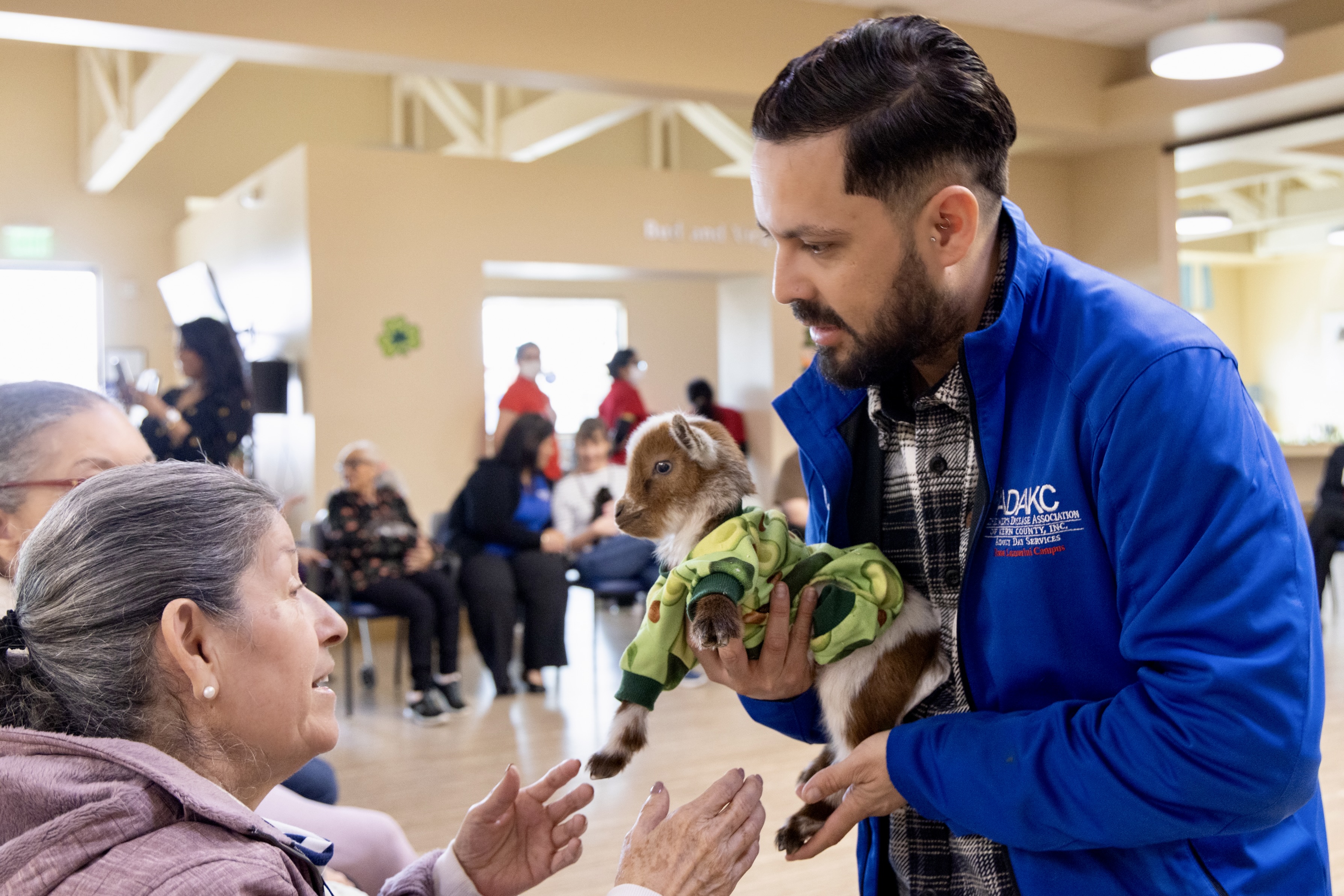The Alzheimer’s Battle Kern County Can’t Afford to Lose

More goat therapy
Alzheimer’s disease is often seen as a deeply personal diagnosis—something that happens to someone else or to someone else’s family. But in Kern County, the numbers tell a broader and more urgent story. Alzheimer’s isn’t just a personal crisis. It’s a community crisis. And it’s growing.
According to the 2025 Dignity Health Community Health Needs Assessment (CHNA), Alzheimer’s disease is now one of the top five leading causes of death in Kern County—ranking higher here than in most other California counties. Kern’s Alzheimer’s death rate is nearly double the national average and significantly higher than the state's.
Behind every statistic is a person: a mother who no longer remembers her daughter’s name. A husband struggling to care for the love of his life. A daughter navigating medical systems, medications, and sleepless nights. As the Baby Boomer generation ages, their children—Millennials and Gen Xers—are stepping into caregiving roles with little warning and even less support.
While Alzheimer’s directly affects those living with memory loss, its reach extends far beyond the individual. For every one person diagnosed, there’s an entire network of people whose lives are changed: spouses, children, neighbors, coworkers, church friends. In Kern County, nearly 12,000 residents aged 65 and older live with Alzheimer’s—a number expected to double by 2060. That means twice as many families navigating caregiving challenges, strained relationships, and a healthcare system already stretched thin.
The effects go beyond homes and hospitals. Alzheimer’s impacts our economy, workforce, and public services. Caregivers often cut back work hours or leave jobs entirely. Local businesses feel the loss when employees are overwhelmed or burned out. Hospitals and emergency rooms see more dementia-related visits, while public assistance programs absorb rising costs as families turn to Medi-Cal, Medicare, or disability services for help.
Even if you’re not a caregiver now—even if no one in your life has Alzheimer’s—this crisis will affect our community. The question is not if, but when.
For caregivers, the journey is long, emotionally draining, and isolating. Many are middle-aged adults—working full-time, raising children, and caring for aging parents. Depression, anxiety, and health issues are common, and without support, burnout comes quickly.
That’s where the Alzheimer’s Disease Association of Kern County, Inc. (ADAKC) comes in. As the only community-based nonprofit in Kern focused solely on dementia care, ADAKC is more than a program—it’s a lifeline. You don’t have to be enrolled in our adult day program to receive help. We offer resources, guidance, and compassion to any Kern County resident affected by Alzheimer’s—whether living with the disease or caring for someone who is.
Every week, our phones ring with calls from people desperate for help. Some need advice on managing difficult behaviors like aggression. Others are at the end of their rope—burned out, exhausted, and unsure they can go on. We even receive calls from caregivers who say the stress has pushed them to thoughts of ending their own life—25 to 30 such calls each month. When someone reaches this level of despair, it’s hard to recover. Our mission is to step in long before that point—to offer resources, relief, and hope to keep families going.
One of the most powerful ways we help is through respite care in our adult day program—giving caregivers a much-needed break while ensuring their loved one is safe, engaged, and cared for. Respite can mean the difference between a caregiver holding on or reaching a breaking point. But because ADAKC (and all adult day programs) are considered social models, not medical care, our services are not covered by insurance—only Long Term Care policies and Veterans Benefits.
We charge $20 per hour—affordable compared to many care options—but it adds up quickly, especially for families in lower income brackets. We work hard to keep rates low through grants and fundraising, but every dollar matters. Donations help ease the financial burden for local families, allowing us to provide sponsored hours of care so caregivers can rest without worrying about cost. Every contribution directly translates into hours of relief for a caregiver and quality care for someone living with dementia.
For over 40 years, ADAKC has served thousands of families with an adult day program that provides safe, enriching activities for those with dementia; support groups and counseling that give caregivers understanding and encouragement; and community education that helps families and professionals better navigate dementia with compassion. Our work is built on kindness, dignity, and a deep understanding of the challenges Alzheimer’s brings—not only to the person diagnosed but to the entire circle of people who love them.
The time to act is now.
If we do nothing, numbers will rise, the burden will grow, and more families will face crisis without help. But if we come together—as a community, as neighbors, as people who care—we can change the story. We can ensure families aren’t left to navigate dementia alone. We can support caregivers before burnout. We can provide safe, dignified spaces for those living with memory loss. And we can prepare for what’s ahead.
Even if Alzheimer’s hasn’t touched your family yet, chances are it will. And even if it doesn’t, you’ll still feel the effects—in healthcare costs, workforce challenges, and increased demand for public services. Alzheimer’s is not just a medical issue—it’s a community issue. And it will take all of us to meet it with compassion, resources, and action.
Alzheimer’s may take memories—but it cannot take our humanity, our compassion, or our ability to stand together. Let’s make sure that as this disease grows, so does our commitment to those it affects.
Let Kern County be a place where no one walks the dementia journey alone.